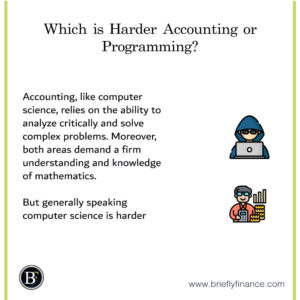I understand the dilemma when deciding which field is harder; accounting or computer science, numerous aspects need to be taken into consideration.
Accounting, like computer science, relies on the ability to analyze critically and solve complex problems. Moreover, both areas demand a firm understanding and knowledge of mathematics.
There’s truth to the cliché of the rushed coder, and to the stereotype of the bored accountant, but neither is universal.

Attribution: The icons has been designed using resources from flaticon.com
If you want the answer, computer science is harder.
However, let’s approach the subject from a few different directions.
Quick Recap
Accounting
Accounting is the process of recording, analyzing, and disseminating data about a company’s financial transactions and other operational data.
Professionally, an accountant reviews financial records, conducts audits, and analyzes financial statements.
In addition, accountants can serve a tiny business, a medium-sized corporation, or a large organization, or they can start their own company.
Computer Science
The field of computer science is concerned with the study of computers and their potential theoretical and practical applications.
Algorithm development, software and hardware design, and AI research are just a few examples of the numerous areas where computer scientists apply their knowledge of mathematics, engineering, and logic.
Education
As studying computer science requires an understanding of statistical techniques and familiarity with programming languages, the field is commonly viewed as more difficult than accounting.
The difficulty, however, will depend on the individual’s passion.
How comfortable are you with technology and do you have an interest in it?
Or
Do you prefer working with concrete data and solving practical problems?
Some of the Accounting courses:
- Micro- and Macro-Economics
- Business Law classes
- Several liberal arts classes
- Several finance-related classes
- Several Accounting classes
- Communications
These are just a sample of the accounting courses that might be required of you as part of your studies for an accounting degree.
Some of the Programming courses:
- Systems Analysis
- Various programming language classes
- Cybersecurity
- Several computer programming classes
- Networking
- Programming Paradigms/Algorithms
There are many more classes required for a computer science major, but these should give you an idea of the scope and depth of your education.
Stress/Workload
Accountants spend an extensive amount of time reviewing financial documentation such as invoices, bank statements, and tax returns. They handle people’s tax returns and are frequently subjected to audits in the course of their work.
On the other hand, computer scientists are experts in their field. Since they devote most of their time to coding and computer programming, they are very good with figures.
There is less pressure in accounting than there is in computer programming. The programming industry is notorious for its high volume of urgent, last-minute fixes and massive projects with short deadlines.
Yet, accounting is not a stress-free occupation; it is rather more routine. The last few days of the month, quarter, and year are always incredibly hectic. The timing of these events is always predictable.
Accounting
The accounting process seems to go smoothly. It seems like the kind of work that you can sit down and start doing right away. Also, it appears to be a more mechanized and streamlined type of work (less mentally taxing and less likely to make your head blow up). A job that can be broken down into manageable chunks.
Depending on your motivations, working for one of the Big 4 could mean long hours and dealing with indifferent or even hostile supervisors. After about two years, most employees leave the Big 4 to pursue other opportunities.
The field of accounting should be more consistent, predictable, and relaxing. But it’s not; at the end of each and every period, the same massive panic ensues. In each quarter, more and more people begin to freak out. It’s strange that something that should be regular and predictable nevertheless separates so far from the norm every month.
Programming
Programming seems like a fun challenge for analytical thinkers. They are the type who enjoys challenging mental activities. Definitely not me. When I was a kid, I wasn’t interested in puzzles, and that hasn’t changed. That appears to be the kind of work where you regularly encounter challenges and become mentally exhausted as a result. Thus, I find that to be a drawback.
Indeed, programming isn’t for everyone. However, if you’re serious about it, I recommend taking an online course for a week or a month to see if you enjoy it and if the material is within your grasp.
Final Thoughts
To live is to concede. Finding a secure career that pays well, requires little effort, and is stress-free is an unrealistic goal. If you’re looking for a stress-free career, be prepared to give up financial security and work stability. This is just the way things go in the real world. This is an anxious world, and you’ll definitely be anxious once you step into the race. Going to a therapist to learn how to cope with your anxiety is the best option.
But conclusively, studying computer science is a great option if you enjoy using computers to solve difficult problems and have a strong interest in doing so. If you’re curious about financial administration, documenting transactions, and reporting results, Accounting is a field you should go into.
Related Posts:
- 6 Reasons Why Accountants Should Learn to Code
- Is Accounting Hard? 6 Myths and their Realities
- Is Accounting a Good Career | Everything you Need to Know
Disclaimer: Above links are affiliate links and at no additional cost to you. I may earn a commission. Know that I only recommend products, tools, services and learning resources I’ve personally used and believe are genuinely helpful and relevant. It is not because of the small commissions I make if you decide to purchase them. Most of all, I would never advocate for buying something that you can’t afford or that you’re not yet ready to implement.
